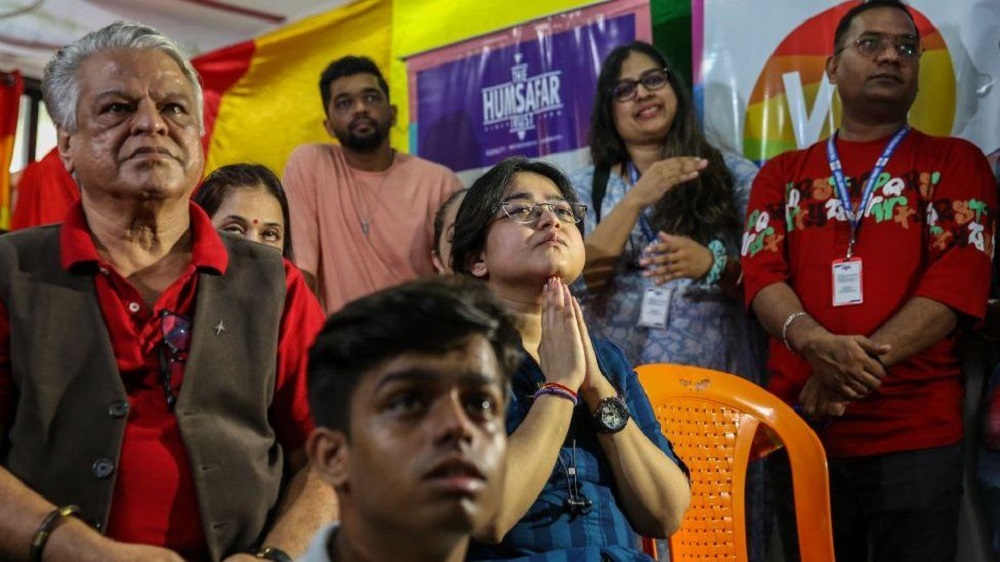News Asia
India’s Supreme Court Refuses to Legitimize Same Sex Marriage

The Supreme Court of India has rejected the legalisation of same-sex marriage unions, dashed the aspirations of millions of LGBTQ+ persons seeking marital equality. Instead, the court accepted the government’s offer to form a group to investigate expanding legal rights and benefits for same-sex couples.
Activists and same-sex couples expressed disappointment with the decision and pledged to continue their struggle. The court was deliberating on 21 petitions filed by same-sex couples and activists. In April and May, the five-judge panel convened extended hearings, which were “livestreamed in public interest.”
The petitioners contended that the inability to marry violated their constitutional rights and rendered them “second-class citizens.”
They proposed that the court simply change the words “man” and “woman” with “spouse” in the Special Marriage Act, which allows marriage between persons of different religions, castes, and countries, to include same-sex unions.
The government and religious leaders had both fiercely opposed the petitions. The administration asserted that only parliament could debate the socio-legal question of marriage, claiming that permitting same-sex marriage would cause “chaos” in society.
Infringed on constitutional rights
The judges agreed with the administration on Tuesday, arguing that only parliament could enact laws and the courts could only interpret them.
They welcomed the government’s proposal, made by Solicitor General Tushar Mehta, to form a committee led by the country’s top bureaucrat to investigate “granting queer couples” the same rights and privileges as heterosexual couples.
The petitioners claimed that their inability to marry infringed their constitutional rights.
Two of the judges, including Chief Justice DY Chandrachud, favoured civil union and providing same-sex couples the same “benefits that married people enjoy.”
The top justice also read a long set of directives to the government, urging them to end all discrimination against the “queer community” and to protect them from harassment and violence. Justice Chandrachud further stated that “queer and unmarried couples” could adopt a child together.
However, once all of the justices spoke, and the majority of three judges on the bench did not support his list, it became evident that Justice Chandrachud’s directions would stay just that.
At the beginning of the proceedings, it appeared like India was on the verge of making history by legalising same-sex marriage.
Change India’s Special Marriage Act
The five-judge constitutional bench previously stated that they would not interfere with religious personal legislation but would consider changing the Special Marriage Act to accommodate LGBTQ+ persons.
However, as the proceedings went, it became evident how complicated the subject was, with the bench admitting that divorce, adoption, succession, maintenance, and other related matters are covered by hundreds of laws – many of which overlap with religious personal rules.
Activists and same-sex couples were “disappointed” by Tuesday’s decision.
“I went to court this morning with high hopes, but as I heard the judges read out their orders, I was deeply disappointed.” Sharif Rangnekar, a gay rights campaigner, told the BBC, “My hopes were dashed.”
“The decision to delegate everything to a government committee with no timetable for when it will be established or when it will provide us with rights leaves us vulnerable to bureaucratic uncertainty.” It’s really concerning.”
Majority Against Same Sex Marriage
According to Pia Chanda, who has been in a same-sex partnership for 34 years, the “Supreme Court is playing passing the parcel.” “This judgement is a predictable farce and will keep the discrimination in place,” the judge said.
In India, attitudes about sex and sexuality remain predominantly conservative. Many people have praised the decision.
The Supreme Court Bar Association’s president, Adish Aggarwala, told reporters that he was pleased that the court accepted the government’s contention that it lacked the authority to legalise same-sex unions.
“That right only rests with the Indian parliament and we are glad that the court agrees with us,” he went on to say.
Mr Aggarwala had previously told reporters that legalising same-sex marriages would be a bad idea since it is “not in accordance with the system prevalent in India.”
The discussion was closely followed in a country with an estimated tens of millions of LGBTQ+ persons. The Indian government estimated their population in 2012 to be 2.5 million, while calculations using global estimates indicate it is at least 10% of the total population – or more than 135 million.
Same-sex couples had been banking their hopes on this critical decision; many had already told the BBC that if the petitions were granted, they would marry.
In India, attitudes on sex and sexuality remain predominantly conservative, and advocates believe the community faces stigma and prejudice.
During the hearing, one of the petitioners’ lawyers, Mukul Rohatgi, stated that society sometimes required a shove to embrace LGBTQ+ persons as equals under the constitution, and that the high court’s ruling will drive society to accept the group.





























